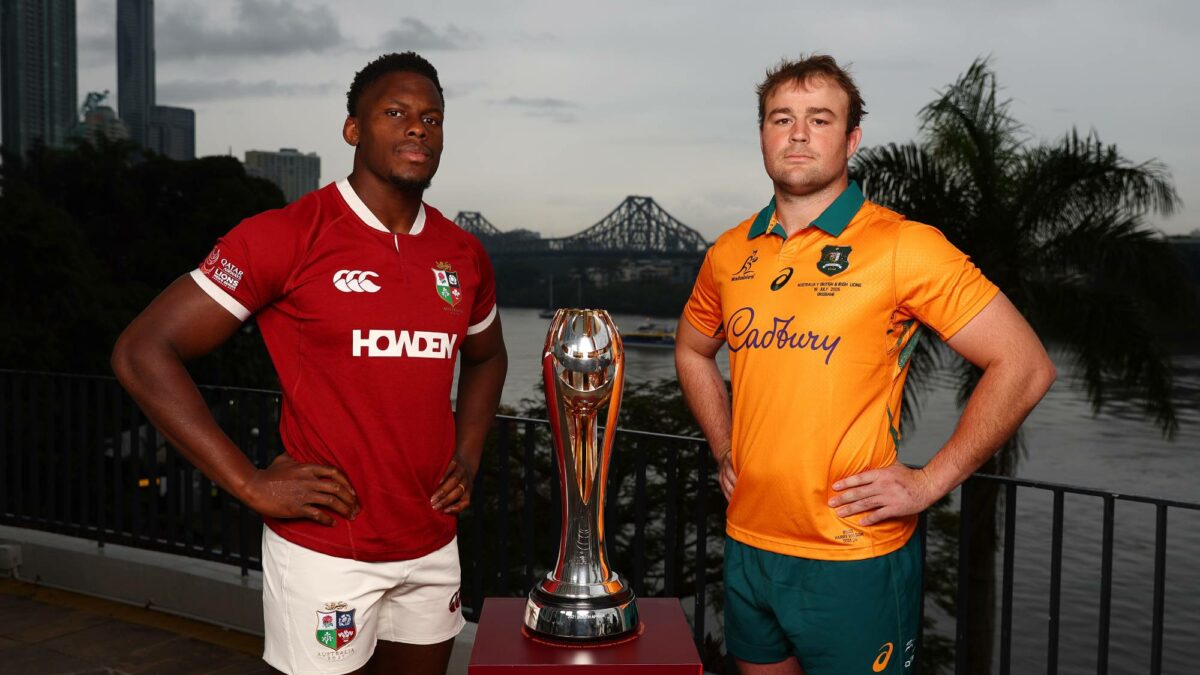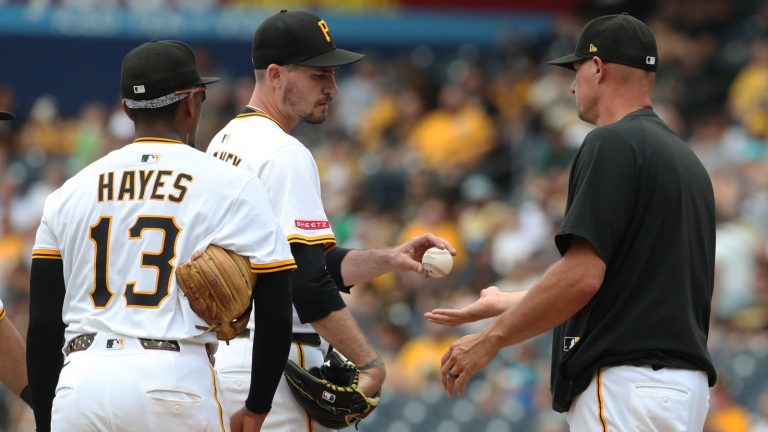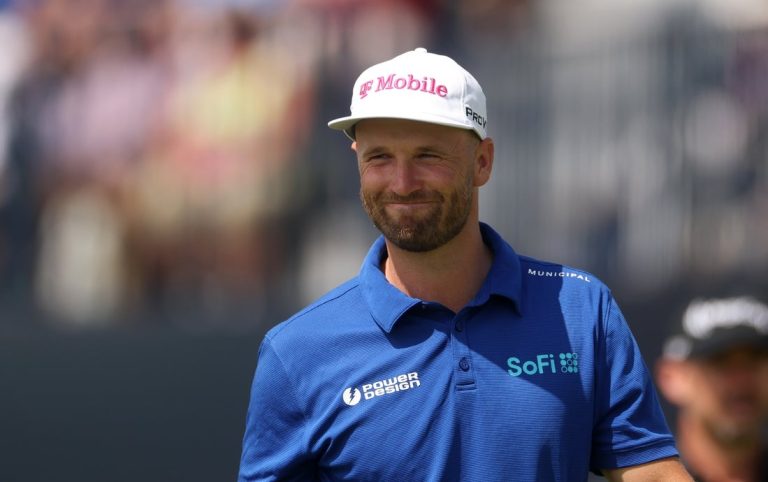The Wallabies must turn the first Lions Test into “guerrilla warfare”, target Finn Russell and keep pace in the game to head to Melbourne with a series lead.
That’s the opinion of former Wallabies coaches Eddie Jones and Ewen McKenzie, who broke down the teams and tactics ahead of Saturday night’s opening Lions Test in Brisbane alongside David Pembroke on the Rugby Unity podcast.
Although the Wallabies are massive $5 outsiders, McKenzie, who led the Reds to the 2011 Super Rugby title and was both the head coach and assistant of the Wallabies, including during the successful 2001 Lions series, said there was “always a way to win”.
“Regardless of who they’re picked, we’re going to have to do something a little bit different and try and get some mental stress on the opposition and put them under a bit of pressure,” said McKenzie, who has largely stayed out of the limelight since sensationally standing down as Wallabies coach ahead of the 2014 Spring Tour.
“If you just go out there and play in an orthodox manner, they’ve got a lot of good guys. They’ve got a lot of great guys coming off the bench, so it’s a matter of being able to manage that side of it.
“So, I always see opportunity in the game and it’s a question of what knowledge you can impart in a week and what level of comprehension you get amongst the playing group to be able to make a difference on the day. But there’s always a way to win.”

British & Irish Lions Captain Maro Itoje and Wallabies Captain Harry Wilson pose during a media opportunity at Stamford Plaza on July 18, 2025 in Brisbane. (Photo by Chris Hyde/Getty Images)
McKenzie didn’t agree with all the selections, saying he would have strongly considered playing two fetchers by starting Caro Tizzano alongside Fraser McReight to provide some more pressure on the Lions.
But one thing he was clear on was that the Wallabies would have to play at pace after the loss of Will Skelton and Rob Valetini.
“It’s a lightweight forward pack, I’d say,” McKenzie said.
“I think you’ve got to keep the pace of the game up. I don’t think stop-start’s going to cut it. You need to be able to keep the tempo of the game up and keep challenging them by doing subtle things differently and keep them under pressure.
“Don’t allow them a chance to catch their breath.
“I watched the games to date, and I haven’t seen anyone throw a quick lineout at you. I’ve seen the Lions do it, but I haven’t seen any of the opponents do it.
“Quick taps. There’s lots of ways. You can keep the pressure on the referee.”
Jones, whose first tenure in charge of the Wallabies was much more successful than his recent one year back in the hot seat, agreed.
“I reckon Australia’s got to play like guerrilla warfare,” Jones said. “They’ve got to be in and out of contests, be moving the ball quickly.
“Maybe the first four penalties you take quick taps. You’ve got to do something that’s going to psychologically upset the Lions early because if it just becomes a settled game of rugby where you go from set-piece to set-piece, the power of the Lions is going to win the game. As Ewan said, their bench will come on and they’ll win the game pretty easily.
“It mightn’t be a big score. They’re not going to win by big scores the Lions. They haven’t got a lot of points in them, but they’ve got a lot of consistency about their set-piece, a lot of consistency about the way they play the game.
“That’s the hallmarks of an Andy Farrell-coached team. From his rugby league background, they talk about in rugby league the long game, just stay in the game, and they’ll play like that. Australia’s got to really risk the game, really try to break the game open, really, really go for it.”
McKenzie added: “Yeah, I agree 100 per cent: guerrilla warfare is a really good way of putting it.
“There’s a lot of things you can do from the kick-off. You don’t have to kick off deep to the left or deep to the right like everyone does, you can kick off somewhere else.
“You’ve got to dictate. You’ve got to give them something different, different pictures to look at, and then try something.”
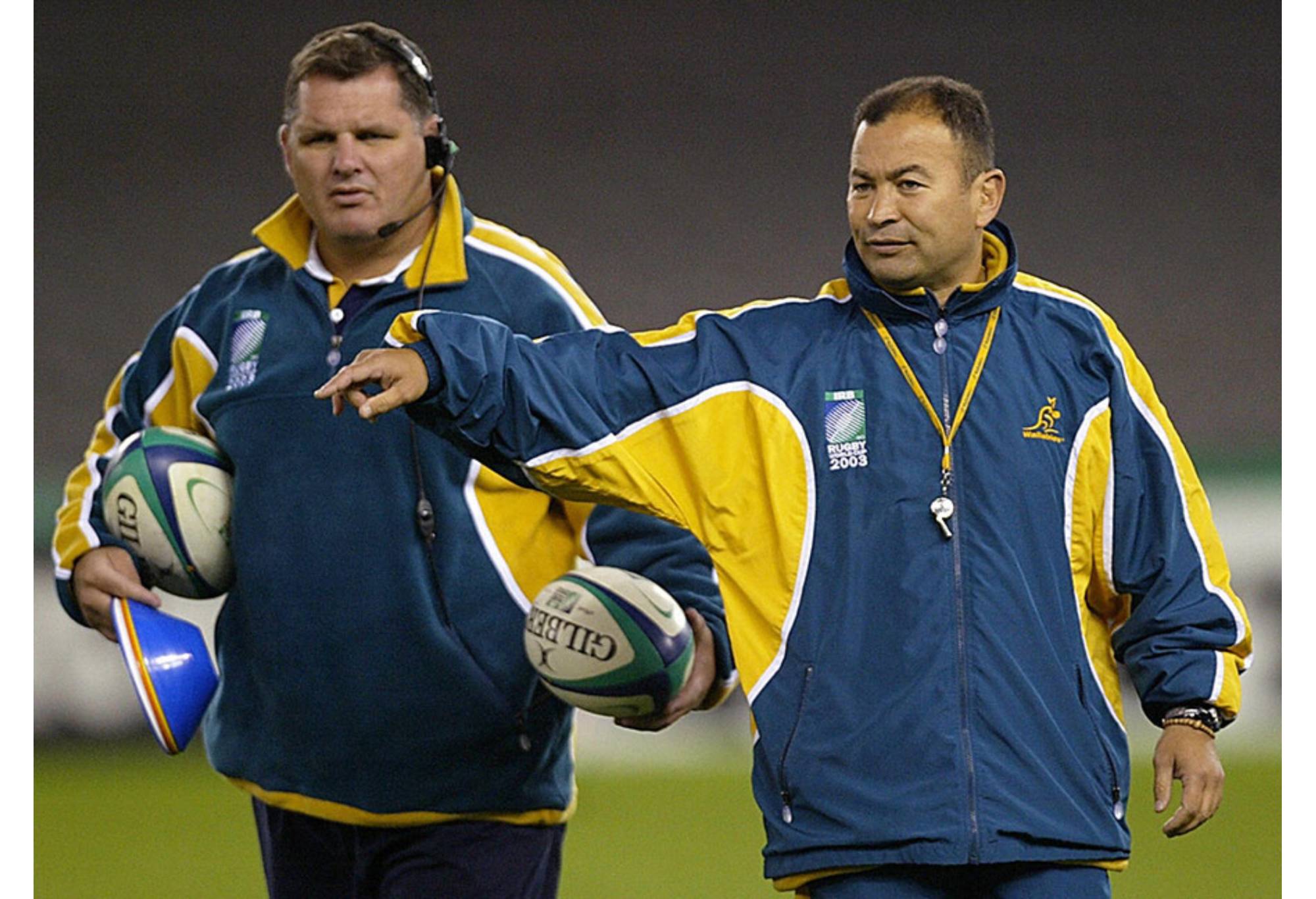
Eddie Jones and Ewen McKenzie have broken down how the Wallabies can shock the Lions. (Photo: Getty Images)
One area where McKenzie believes the Wallabies could have got some ascendency is at the breakdown.
Despite Welshman Jac Morgan having huge success at the breakdown, Farrell opted for the work rate and dogged nature of Tom Curry – the England back-rower.
But with Ben O’Keeffe in charge of the first Test, McKenzie believes Morgan would have been given more leeway to attack the breakdown and he thinks the Wallabies should instead go for it there to make it a mess.
“The one guy that I thought was interesting was Jac Morgan,” McKenzie said. “He was the guy who was actually spending time trying to stay on the ball. In other words, adopting a southern hemisphere approach because you get reward from that from a Kiwi ref.
“When I saw the referee and thought about it, and I know Eddie, we’ve done this before, we did it with the [Phil] Waugh-[George] Smith combo.
“I would have thought Tizzano and McReight might have been an interesting combination with, let’s say, [Tom] Hooper as a back-row. For me, that’s a really interesting back row because there’s lots of things, lots of pressure. If you get a little bit slow to the breakdown and you’ve got guys that can contest part of the ball, you’ve still got a lot of that presence.
“I know that leaves the captain [Harry Wilson] out, but I’m just looking at the way that things set up. Another way of testing the opposition is to have more presence in the breakdown.”
Jones agreed, saying O’Keeffe tended to “like a quicker game”.
“He wants to steer away from scrum contests, more contests,” Jones said. “He likes the ball in and out.
“But I think Link’s point about where could potentially Australia get a point of difference, it could be at the breakdown.”
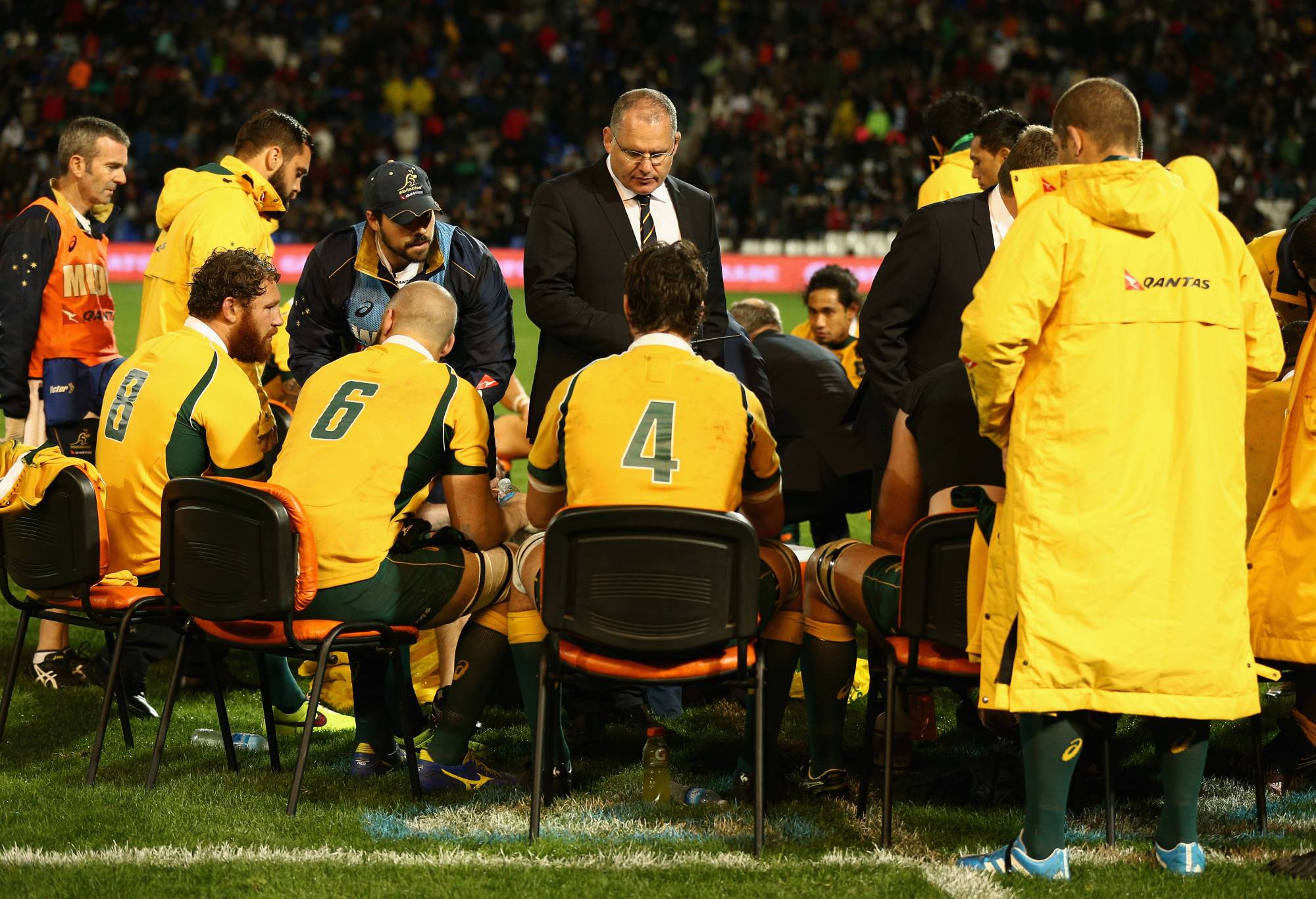
Former Wallabies coach Ewen McKenzie talks to the Wallabies at Estadio Malvinas Argentinas on October 4, 2014 in Mendoza. (Photo by Cameron Spencer/Getty Images)
Jones, who holds the highest win percentage of any England coach (73 per cent), said if the Wallabies made it a scrap at the breakdown it would help them slow Russell’s influence on the game.
“You’ve got to try to make him play as an individual,” Jones said. “And to make him play as an individual, you’ve got to try to get him to shift the ball. So, if they can make those first couple of rucks a real fight, that will encourage him to move the ball away.
“Because a lot of what Ewan’s saying is that you’ve got to make the Lions play as individuals. You’ve got to put enough pressure on them to make them play as individuals because they are all stars in their own right.
“So if there is a problem in the game, they will have the thinking that they want to solve it themselves. And that then creates an opportunity. And we’ve seen that with Lions teams. If you go back to 2001, what happened? Players wanted to solve it by themselves. And Australia were dead after the first half of the second and third test, they (the Lions) had the games won, didn’t they? But they (the Wallabies) were able to put enough pressure on them to make them play as individuals.”
McKenzie said the Brumbies, who had great pay at the ruck through Hooper and Luke Reimer, provided the blueprint of how the Lions can be slowed down.
“I think the Brumbies gave us a little bit of a preview,” he said.
“They made that game. It was turgid. It was a little bit ugly at the breakdown. But it didn’t have any rhythm. And they were in the game for some time.
“Particularly that first half. They, for me, gave them pointers. They made a bit of a mess out of it.”

Tom Lynagh will be up to the challenge of taking on the Lions, according to Ewen McKenzie. (Photo by Bradley Kanaris/Getty Images)
Despite Wallabies coach Joe Schmidt opting for the inexperienced Tom Lynagh at flyhalf, with the 22-year-old to make his starting debut after three Test off the bench, both McKenzie and Jones believed the Reds No.10 would be up for the challenge and handle the occasion.
“Tom, I think he’s quite an accomplished player,” McKenzie said.
“I think he’ll be a steady influence. Even though he’s pretty raw at this level, I actually think he’ll be all right. So I’m happy with that selection.
“But it’s going to be up to everyone. There’s no one person that’s going to… You’re going to have to have a set of tactics, and then everyone’s going to have to do their bit.”
Jones, who was in charge of the Wallabies when Lynagh burst onto the scene, agreed that the No.10’s composure was an asset.
“I think I saw him in his first Super Rugby game. I was really impressed by his maturity,” Jones said.
“He’s one of those young 10s. He knows the game pretty well. He knows when to kick long. He knows when to kick high. Individually, he’s not massively talented, but he’s a very, very solid, good-thinking player.
“He’s got a good background being educated in English rugby and that sort of game-management type. He reminds me a lot of Finn Smith, the English 10, that they know the game pretty well. They might be young, but they know the game pretty well.”
Jones said he thought the Wallabies would kick a lot and believed Harry Potter, the former Leicester Tigers winger, would challenge well in the air.
“I think his (Lynagh’s) job will be to keep turning the lines around, keep turning them around, and his ability to find space or to find the contest is going to be important,” Jones said.
“That’s why I reckon they’ve picked Potter because he should be playing Aussie rules, mate. He’s good in the air, and he’s a good kid too. He’s done it the tough way. He couldn’t make it in Australia, but he played for Sydney Uni, went over to Leicester, chased high balls for two seasons.
“All he did was chase high balls, and he was good at winning them. It’s a real credit to him. He’s come back to the force again, fought hard.”
It shows you if you haven’t got a lot of talent, the effort and the application, you can still make it to the top. He’s a real success story, I reckon.
